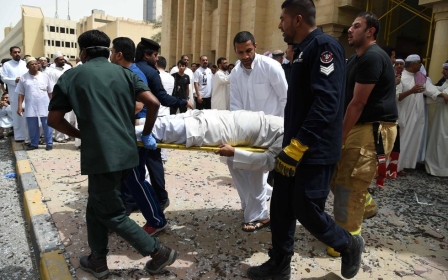Kuwait mulls new 'anti-terror' laws after mosque bombing

Kuwait's Oil Minister Ali al-Omair said the government will examine on Monday new security legislation, following a suicide bomb attack on a Shia mosque that left 26 dead.
"The cabinet will discuss this issue Monday," said Omair when asked about a government plan to introduce anti-terror legislation. He provided no details.
Several MPs have said they will pass any such legislation needed to crack down on "extremists".
"If they need more legislation, we are prepared in order to strike at the elements of evil and terrorism," Shia MP Abdulhameed Dashti said in a statement.
Kuwait on Sunday identified the suicide bomber behind the attack as a Saudi national.
Friday's attack also wounded 227 worshippers in the first bombing of a mosque in the tiny Gulf state and Kuwait's security services have vowed to catch and punish those responsible.
The Islamic State group's Saudi affiliate, the so-called Najd Province, claimed the bombing and identified the assailant as Abu Suleiman al-Muwahhid.
In a statement, Kuwait's interior ministry gave the real name of the attacker as Fahd Suleiman Abdulmohsen al-Qaba'a, born in 1992.
It said that he entered the country through Kuwait Airport at dawn on Friday, the same day of the bombing.
A handout photograph of Qaba'a showed a young bearded man wearing a traditional Saudi headdress.
Earlier on Sunday, the ministry said that security services arrested the driver of the car that transported the bomber to the Al-Imam Al-Sadeq mosque in Kuwait City.
He was named as Abdulrahman Sabah Eidan Saud, 26, and described as an "illegal resident," the term Kuwait uses for stateless people locally known as bidoons.
Authorities on Saturday arrested the car owner, Jarrah Nimr Mejbil Ghazi, born in 1988, and also listed as a stateless person.
Security services have also detained the owner of a house used as a hideout by the driver, describing the owner as a Kuwaiti national who subscribes to "extremist and deviant ideology".
Around 110,000 bidoons live in Kuwait and claim the right to citizenship.
Alleged IS executioner Mohammed Emwazi, who became known by media as "Jihadi John", was born in Kuwait to a stateless family of Iraqi origin which later moved to London.
The breakthroughs in the bombing probe came a day after thousands of Kuwaitis braved scorching summer heat on Saturday to attend the funerals of 18 victims.
Mourners turned out in large numbers for the funerals despite the Ramadan daylight fast and as temperatures hit 45 degrees Celsius (113 Fahrenheit).
Tens of thousands of people headed by the emir offered condolences late Saturday to relatives of victims at Kuwait's Grand Mosque, the largest place of worship for Sunni Muslims, in a show of solidarity.
The cabinet announced after an emergency meeting on Friday that all security agencies and police had been put on alert to confront what it called "black terror".
Justice and Islamic Affairs Minister Yacoub al-Sane said additional security measures will be taken around mosques and places of worship.
The emir, government, parliamentary and political groups and clerics have all said Friday's attack aimed to stir up sectarian strife in the emirate.
Kuwait's Emir Sheikh Sabah al-Ahmad Al-Sabah instructed authorities Sunday to repair the mosque damaged by the blast.
Local media said 18 of those killed were Kuwaitis, three Iranians, two Indians, one each from Pakistan and Saudi Arabia and one bidoon.
Middle East Eye propose une couverture et une analyse indépendantes et incomparables du Moyen-Orient, de l’Afrique du Nord et d’autres régions du monde. Pour en savoir plus sur la reprise de ce contenu et les frais qui s’appliquent, veuillez remplir ce formulaire [en anglais]. Pour en savoir plus sur MEE, cliquez ici [en anglais].




